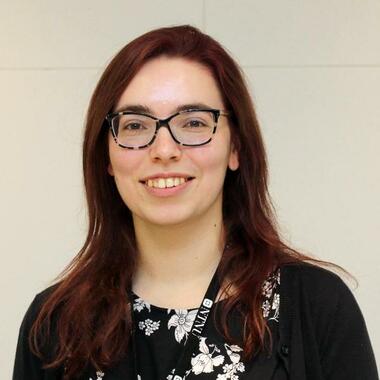
Stine Breden Bjurlemyr
Mechanical Engineering (NTNU)
Campus Gjøvik
Industry 4.0
My PhD-project
Project Title: Adaptive Process Control of Zero Defect Products
Brief description: Industry 4.0 has allowed the strategies of Zero Defect Manufacturing (ZDM) to prosper, and with that, new bursting technologies. With the growing focus of mass customization in Industry 4.0, the small and medium sized enterprizes (SME) are under harder competition than before and need to adjust. This thesis focuses on how Industry 4.0, and ZDM principles can be utilized in SMEs in Norway. Starting with the larger, holistic view including roadmapping and templating technology stack for ZDM. Thereafter narrowing down, looking specifically at defect detection in wood with machine learning among other methods, using Norwegian manufacturig businesses as use cases.
Background: Stine is a PhD candidate at the Department of Mechanical and Industrial Engineering at the Norwegian University of Science and Technology (NTNU). She graduated with a MSc in Physics and Mathematics at NTNU in 2013, where the focus was within Industrial mathematics. Before starting her PhD, she worked in academia with interdisciplinary and virtual teamwork, and teaching mathematics. Her academic interests focus on real-world applications, and spans industry 4.0, machine learning, algorithms and so on.
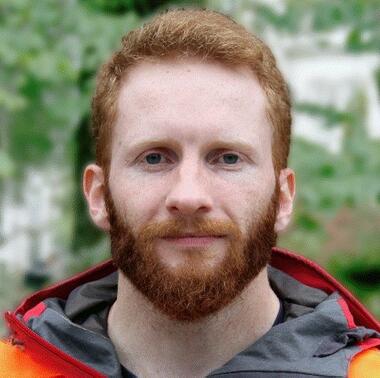
Tommy Langen
Technology (USN)
Campus Kongsberg
Systems Engineering
My PhD-project
Project title: Human Systems Integration in unmanned systems through conceptual modeling and data sense-making
Brief description: Systems are becoming increasingly complex. Having human operators integrated with autonomous solutions imposes challenges for engineers developing such socio-technical systems. This research examines how the industry can utilize conceptual models and data sense-making techniques during a human systems integration approach in the early product development phase. Through conceptual modeling, we create static and dynamic models with an abstraction of complex systems. In data sense-making, we utilize technical, organizational, and human systems data to explore and support the models. The combination can enhance the exploration and insight in a format that is understandable and shareable with key stakeholders. This project uses action research methodology with case studies and industry as the laboratory in collaboration with companies working towards manned-unmanned-teaming. There is a need for the industry to understand how their unmanned systems interact with human operators, how to model the complexity, and how to utilize data suitably.
Background: Tommy is a Ph.D. candidate at the University of South-Eastern Norway (USN), campus Kongsberg. He holds a Master of Science in Systems Engineering with Industrial Economics and a bachelor's in mechanical engineering with Product Development from USN. He has several years of experience in the Subsea Oil & Gas and the Defence industry, working from early concept to testing of complex systems.
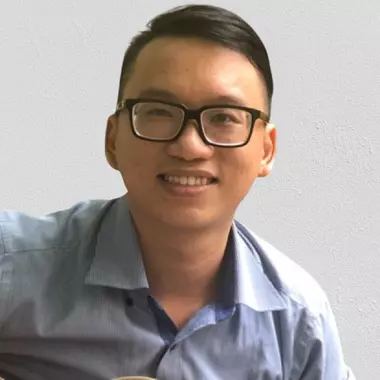
Le Nam Hai Pham
Technology (USN)
Campus Porsgrunn
Energy Systems
My PhD-project
Project title: Cyber-physical convergent information communication technologies (ICT) for virtualised protection and control functionalities in energy systems
Brief description: Comparison between traditional and proposed approaches. (a) Traditional control and protection functionalities are applied to a power converter-based resource. (b) Proposed omnipresence cyber-physical convergent-purpose (PhD project) is applied to power converter-based resources. The physical system sends the measurement via sensors to cyber system, then cyber system with 3C (communication, control, computation) features will return feedback signal to physical system. The objectives of the study is to:
- Create a methodology for virtualisation of the control and protection functionalities in the energy system.
- Create a methodology that can have convergence possibilities of independent technologies (protection/controllers, power electronics devices, digital communication technologies, etc.)
- Carry out experiments using laboratory-based real-time simulations, to test and validate the most promising solution and generate the project outcomes that can be disseminated and exploited.
Research methodologies:
- OBJ1: The methodology of constructing SCADA system is applied. Digital twin, which is a virtual representation of a real-world physical system or product, can be applied in this objective.
- OBJ2: The object-oriented modelling approach is used. With this method, the control and protection functionalities or more can be merged into one-for-all purposes that can be inherited advantages and eliminate disadvantages of these technologies.
- OBJ3: The real-time simulation and the use of Hardware-in-the-loop (HIL) can fulfil the requirements. The execution of the simulator should have the small time steps in accordance to the real-time constraints of the physical target. The testing experiments for the proposed method are performed mainly at the real-time hardware-in-the-loop laboratory of DIgEnSys-Lab [1] (Digital Energy Systems and Lab) at University of South-Eastern Norway.
Completed work:
- Non-directional Overcurrent Protection Relay Testing Using Virtual Hardware-in-the-Loop Device (Book chapter – submitted).
- Distance Protection Relay Testing Using Virtual Hardware-in-the-Loop Device (Book chapter – submitted).
- A Short-circuit Analysis in CIGRE European Medium Voltage Distribution Network (Journal – under Prof’s review).
- Exploring Cyber-Physical Energy and Power Systems: Applications, Challenges and Simulation Approaches (Review paper – under review).
Completed work:
- Real-time cyber-physical system for controlling reactive power using IEC 61850 communication protocol. (Target journal)
- Ethics in using AI
Background: Le Nam Hai Pham or Lee is currently PhD candidate at University of South-Eastern Norway, campus Porsgrunn.
I was educated at University of Technology in Ho Chi Minh city, Vietnam and graduated a bachelor’s degree in electrical and Electronics Engineering before spending nearly 4 years serving in technology consultant company in Vietnam.
In 2022, I received Master’s degree in Electrical Power Engineering at University of South-Eastern Norway and is recruited to become PhD Research Fellow, current position.
My interest is smart grids, cyber-physical systems, renewable energy, static and dynamic power grids.
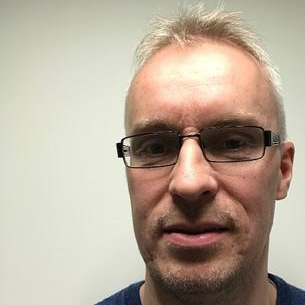
Rune Haugen
Technology (USN)
Campus Kongsberg
Systems Integrations
My PhD-project
Project title: Use of Automation Processes for Detection of Emergent Behavior during Systems Integration Testing
Brief description: A potential for improvement regarding test coverage for the company developed products is what triggered this PhD project. My research is about use of automation processes for detection of emergent behavior during systems integration testing. I will conduct action research using the industry-as-laboratory. The goal of my PhD project is to establish a set of "best practices" for detection og weak emergent behavior in engineered complicated systems using case studies as "proof of concepts". These guidelines can help an observer to a better understanding of the system-of-interest, reducing the perceived emergent behavior and complexity. Emergent behavior and complexity are related terms, scaled according to the difficulty of understanding the behavior of the system and the system itself. Design of experiments and automation will be the areas explored in different ongoing company projects. The value for the company will be to ensure more robust products through smarter testing, discovering more inherent undesired system behavior at an earlier stage, facilitating cheaper mitigation efforts. The timeframe of my PhD project is four years (01.01.2021-31.12.2024), where 75% of my time is allocated to research related work and the remaining 25% is anything related to company projects.
Background: Rune is an industrial-PhD candidate at the University of South-Eastern Norway (USN), campus Kongsberg. He holds a Master in Systems Engineering from USN and a Bachelor in Engineering within System Design from USN. He holds a position as a Senior System Engineer in the company Kongsberg Defence and Aerospace (KDA) with many years of experience within product development (system design and system test). Prior to his career in engineering, Rune was in operational service with the Royal Norwegian Air Force for six years, including graduation from the Air Force Academy.
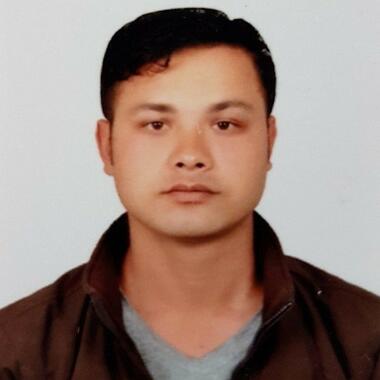
Ashish Shrestha
Technology (USN)
Campus Porsgrunn
Energy Systems
My PhD-project
Project title: Real-time estimation of the energy-mix-limit for the secure operation of converter dominated power system
Brief description: Most countries have created measures to increase the implication of renewable energy by incorporating a new form of renewable energy resources (RES) into the electricity grid. Power electronic converter (PEC) based technologies are quickly changing the generation, transmission, distribution, and utilization levels of the modern power system. Decreased rotational inertia immediately affects system frequency and operational security. A system with low inertia can cause unnecessary blackouts due to frequency variability. A decrease in system inertia raises the RoCoF and the nadir frequency. Voltage stability, rotor angle stability, and frequency control approaches have all been extensively studied in the past. However, real-time control stability has received little attention, despite being the principal cause of recent blackouts. The presented investigations do not produce tangible outputs with sufficient validation and have various limitations. There are still many research gaps in this field, which will be filled soon. Hence, this PhD project aims to develop a novel methodology for estimating real-time indicators and ensuring short-term frequency stability of the PEC-integrated power system in normal and emergency situations. It will include developing and testing a method to discover the optimal mix of energy resources and characteristics for a secure power system. The historical and off-line data will be used to construct an algorithm that can be tested in a real-time simulation environment. The tasks will be performed using deep learning, reinforcement learning, and probability programming. The final goal of this PhD thesis is to test and validate the proposed methodology and information model in a laboratory setting. Co-simulation with hardware in the loop will be used to assess the methodology's appropriateness. The system parameters will be evaluated using various standards and grid codes (especially focused on the Nordic grid).
Biography: Ashish Shrestha received a Bachelor's degree in Electrical and Electronics Engineering from School of Engineering, Pokhara University, Nepal, and a Master's degree in Planning and Operation of Energy System from School of Engineering, Kathmandu University, Nepal. He was also an Erasmus Mundus candidate at the Department of Electrical Engineering, Frederick University, Cyprus, funded by European Union. Currently, he is doing his PhD at the Department of Electrical Engineering, Information Technology and Cybernetics, University of South-Eastern Norway, Porsgrunn Campus, Norway. Before his PhD, he was working as a Lecturer at the Department of Electrical and Electronics Engineering, and a Researcher (Activity Leader) at Center for Electric Power Engineering (CEPE), Kathmandu University, Nepal for three and half years. He was also involved in the problem-based-learning project funded by Erasmus+ program of EU, and was leading a project under the funding of Ministry of Foreign Affairs (MFA), Norway, as the Project Co-Principal Investigator. Till today, he published 48 peer-reviewed journal articles and international conference papers and was assigned as a reviewer for numerous international conferences and peer-reviewed journals from IEEE, Springer, Elsevier, IET and so on. His research interests include Power System Dynamics, Distributed Generation Resources, Planning and Operation of Energy System and so on.
Zhe Ban
Technology (USN)
Campus Porsgrunn
Oilwell Drilling
My PhD-project
Project title: Process Technology in real time data verification and reconciliation for optimal oil production under the presence of uncertainties
Brief description: The purpose of this research project is to improve existing oil well models by using collected data and use them for dynamic data reconciliation and gross error detection. Data for this study can be collected from both simulation and petroleum industry. This study follows the casestudy design for models of artificial lifting oil wells, with indepth analysis of the uncertainty in the dynamic model. By employing these firstprinciples models, process model constraints are adopted for data validation and data reconciliation
Background: Zhe is a PhD candidate at the University of South-Eastern Norway, campus Porsgrunn. She holds a Master in Advanced Control and Systems Engineering from The University of Mancheste and a Bachelor in Automation at Tianjin University of Commerce. Before her PhD, she previously worked for several years in the robotics field and electrical and electronics engineering. Her interest is data analysis, modelling and simulation, especially data processing, data-driven physics-informed modelling considering uncertainty, gross error detection and data reconciliation.

Christian D. Øien
Mechanical Engineering (NTNU)
Campus Gjøvik
M.L. for Industrial Processes
My PhD-project
Project title: Towards digital twin enabled thermo-mechanical processing of post-consumer recycled aluminium.
Brief description: The demand for aluminium in automotive industry is currently increasing significantly, most likely by a factor 3 to 5 from 2020 to 2050. Since the energy consumed in aluminium recycling is only 5-10% of primary production, increasing the use of secondary aluminium is an effective means of limiting the industry's correspondingly increasing CO2 footprint. The use of recycled aluminium in manufacturing is, however, currently limited by the accumulation of grain refiners, impurities and alloying elements. This leads to a downgrading which is today mostly directed towards casting alloys, and so there is a need to increase the ability to keep secondary aluminium within wrought applications. My PhD will center around process planning and control of aluminium extrusion processes based on post-consumer scrap (PCS), aiming to remedy the loss of process control and product characteristics by extracting information from industrial process data with machine learning. It will create knowledge about model implementation, system characteristics, and system integration to successfully utilize this technology in the aluminium extrusion industry.
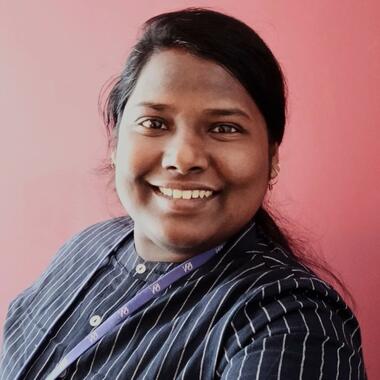
Jothinarayanan Nivedhitha
Applied Micro-and Nanosystems (USN)
Campus Vestfold
eDNA
My PhD-project
Project Title: Improvement and development of new equipment for automatic sampling and processing of environmental DNA (eDNA).
Brief Description: Micro Total Analysis Systems (μTAS) are devices that automate and include all necessary steps for a chemical analysis of a sample. These miniaturized fluidic systems or lab-on-a-chip (LOC) platforms can perform laboratory operations (preparation, separation, detection) on a single device. One of their beneficiaries is small size and channel dimensions of the order of tens of micrometers, μTAS platforms feature negligible sample consumption, reduced cost of the process, and short analysis time.
The focused research will be on micro- and nanotechnologies to improve and develop new equipment for automatic sampling and processing of environmental DNA (eDNA). Many different micropumps, microvalves, optical systems, microchannels, microreactors, micromechanical devices, microelectronic devices, heating elements and fabrication methods have been developed over all these years in the SALICO instrument. These to be tested in proximity at each component during the execution of experiment. Automatic environmental monitoring equipment provides a unique opportunity to monitor the presence of different biological indicator species like pike in rivers and lakes. Because it is an invasive species in fresh water and easily prey upon the small community fish species and destroy. The SALICO cassette with microfluidic chip is designed in a way of performing the molecular assay of Loop mediated Isothermal Amplification (LAMP), Nucleic acid sequence-based amplification (NASBA) together with extraction of DNA/RNA and could be used in the fields (i) the aquaculture industry, (ii) molecular eDNA environmental monitoring and (iii) home-based primary health monitoring of humans and animals. The source of samples are water, mucosa and salvia and have been tested inside the SALICO cassettes with different methods such as LAMP and NASBA. Viruses, bacteria, salmon, and pike have been detected both manually and automatically in the prototype technology. Automatic purification of DNA and RNA from all these samples has been repeatedly demonstrated in our laboratory. Another inconvenience in field monitoring is, the bio reagents could not be stored at room temperature, due to enzyme degradation.
The first objective of the project is to synthesize the lyophilized beads with primers and probes of pike-mitochondria Cyt b gene, confirm the beads are bio active and testing the performance for long term. This lyophilized bead could be stored in on site, where resources are limited and does not require cold chain for transportation. The suitable stabilizing agent and percentage is determining factor in protecting the bioactivity of enzyme and primers in lyophilized beads. Further, the bioactive beads will be tested on the new prototypes on instruments and Lab on Chip platform. The gene selection and primer designing is the vital step in setting the experiment. The second objective is to pretreat the eDNA sample in appropriate method (filtration), before entering the Lab on Chip. This work is performed in coordination with a consortium. The amplification rate of DNA and specificity are analyzed with the development of primers and probes.
Currently, there is no equipment available for on site, real time, environmental monitoring of eDNA. So, the output of this project will be better preventive in environmental technology.
About Me: I am PhD candidate at Department of Microsystems, University of South-Eastern Norway, Vestfold campus. I received a graduation in Master of technology - Biotechnology (six year integrated program), from Bharathidasan University, India. After an education, I got a research assistant position in one of the renowned research institutes named, CSIR- Central Electrochemical Research Institute, India and earned a research experience in various stream of approach. I took the opportunity to work with team members and publish 6 research papers, since I was engaged in Industry project.
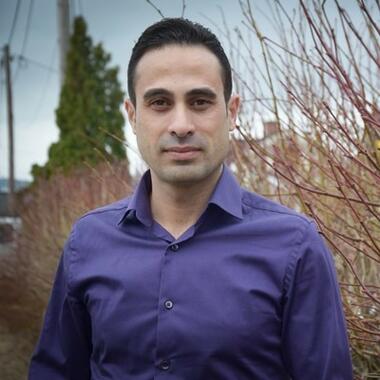
Haytham Ali
Prosess, Energy and Automation (USN)
Campus Kongsberg
Product Development
My PhD-project
Project Title: Utilizing Big data within early phase of the New Product Development Process (NPD).
Brief Description: The phd project strives to utilize feedback data in terms of failure data in the early phase product development process to enhance data-driven decision-making. The project also seeks to use conceptual modeling and data analysis to guide and support each other in an iterative and recursive manner.
Background: Haytham B. Ali is employed as PhD research fellow and Assistant Professor at the University of South-Eastern Norway (USN). He is working on connecting engineering with science, focusing on mathematics. Haytham focuses on his PhD at using a combination of conceptual modeling and data analysis to enhance the early design phase in the product development process. He holds a Master of Science in Systems Engineering with Industrial Economics degree and a Bachelor's degree in Mechanical Engineering with a specialization in Product Development, both from USN.
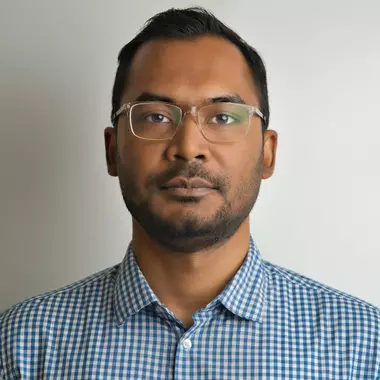
Hasan Mahub Tusher
Nautical Operations (USN)
Campus Vestfold
Virtual Reality (VR)
My PhD-project
Project title: Effective Utilization of Virtual Reality (VR) affordances in Maritime Simulator Training
Brief description: Virtual Reality (VR) has emerged as a potential alternative form of technology which could assist the contemporary training goals of full-mission maritime simulators. VR has already been used as a training intervention in different levels of training in several safety-critical domains (aviation, maritime, health, education etc.). The integration of immersive technologies in Maritime Education and Training (MET) could pave new ways for skill training for the operators working with manned, unmanned, remote or future autonomous technologies in differing maritime workplaces constituting complex socio-technical systems. Research to create, validate and improve VR training intervention will open doors to more innovative solutions to be integrated in MET practices.
The aim of the PhD project is two-fold. During the first phase, the current state-of-the-art of VR simulators will be explored in maritime education and training contexts. A literature review has been conducted to get an overview of VR simulators for education and differing skill training purposes. In addition, a hybrid Multi-Criteria Decision-Making method (MCDM) have been utilized to evaluate the current state of maritime VR simulators compared to others.
On the second phase, novel methods for training and assessment will be proposed to increase the efficiency of VR simulators. Data collection methods include surveys, interviews, and simulated experiments. Artificial Neural Network (ANN) modelling will be utilized to develop a novel assessment framework for the trainees in VR. Exploring differing constructs such as motivation, self-efficacy and technology acceptance of the maritime trainees to get better insights into their immersive learning process are some of the potential scopes of the project. The remaining duration for this PhD project is three (03) years.
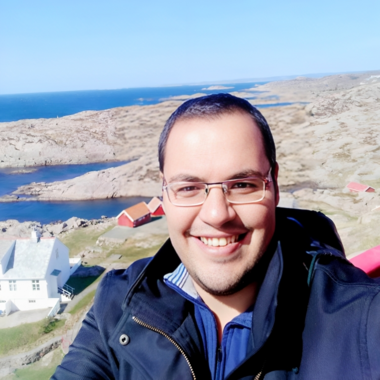
Mahmoud Sayed Eid
Engineering Science (UiA)
Campus Grimstad
Mechatronics
My PhD-project
Project Title: Intelligent Diagnosis of Multiple Faults of Permanent magnet Synchronous drives
Project Description: In today's fast-paced industrial world, cutting-edge technology like highly efficient electric machines and the Internet of Things (IoT) are becoming increasingly prevalent in complex applications such as wind turbines, electric vehicles, centrifugal pumps, and compressors. As a result, ensuring the reliable and efficient operation of these applications is more important than ever. That's why our team is working on developing intelligent fault diagnosis schemes for Permanent Magnet Synchronous Motors using state-of-the-art machine learning and data-driven methods. Our goal is to detect faults in industrial applications at an early stage, allowing for more reliable operation and reduced production downtime. With our cutting-edge research, we're confident that we can help companies in a variety of industries to stay ahead of the curve and achieve greater success.
Background: Mahmoud Sayed, a PhD research fellow based in Norway. He received his BSc in Mechatronics engineering from Helwan University, Cairo, Egypt, in 2013, followed by his master's degree in advanced mechanical and robotics engineering from Ritsumeikan University, Kyoto, Japan, in 2019. Mahmoud is currently pursuing his PhD studies at the Top Research Center Mechatronics (TRCM), Department of engineering and sciences, University of Agder, Norway, where he is exploring his passion for data-driven fault diagnosis, electric power trains, electromagnetic modelling and artificial intelligence. With a strong background as a Project Engineer and Research Assistant, as well as experience as an Assistant Lecturer at the Mechatronics Research centre, (MRC), Helwan University, Cairo, Egypt (2019-2021), Mahmoud's expertise and knowledge make him a valuable member of the team.

Zubair Masaud
Applied Micro-and Nanosystems (USN)
Campus Vestfold
Materials Science
My PhD-project
Title of the project: Fabrication of Single-Atom Catalyst (SAC) based Metal Covalent Organic Frameworks (MCOFs) with CO2 reduction and water splitting applications.
Project Description: The recent trends in the world’s energy consumption patterns indicate an expected 48% surge in energy demand by the year 2040. The major donor to accommodate these growing energy projections is fossil fuel combustion which will still provide a 78% contribution to total energy generation by 2040. However, this anthropogenic combustion of carbon-based fossil fuels leads to the release of greenhouse gases in the atmosphere which is responsible for universal issues such as global warming, environmental pollution, and climate change. Therefore, it is the need of the hour to reduce greenhouse gases by decreasing the reliance on fossil fuels in tandem with somehow fulfilling the ginormous energy demand. This precedence has led to an increasing interest among the scientific community in seeking solutions for these global issues. One of the prospected solutions is the attractive hydrogen economy that revolves around the generation of hydrogen mainly by water-splitting, followed by its storage and then employing it as a fuel to close off the cycle. Another perspective is to utilize the greenhouse gases for their available CO2 content to convert them into meaningful products such as energy-dense fuels and other useful chemicals such as formic acid, methanol, ethanol, etc. Therefore, the goal of this project work would be to synthesize novel single atom-based metal covalent organic frameworks (MCOFs) with a particular focus on electrocatalysis for CO2 - utilization and water splitting applications. These materials possess unique properties such as ginormous surface area, open porosity, mesoporous structures, metal utilization sites, tuneable structures, enhanced stability, and cost-effectiveness. The promise of similar MOF materials is already visible as numerous industries around the world such as Svante (Canada) are already applying this kind of materials for CO2 capture applications. Moreover, if these materials are utilized with attractive techniques such as pulsed electrocatalysis, there is a possibility of achieving unique efficiencies and selectivities. These materials may well be the future of electrocatalysis in various environmental and renewable energy applications.
Background: I am currently a Ph.D. student (in first year of my Ph.D. program) at USN Norway (Department of microsystems, Vestfold Campus). Moreover, I am a trained and qualified individual with a Masters's degree in Advanced Energy and System Engineering from University of Science and Technology (UST, Republic of Korea) following a background in Materials Science. In addition to working with fabrication of materials for CO2 utilization and hydrogen splitting as a part of my PhD program, I have around 3 years of research experience in the fabrication and application of Solid Oxide Fuel Cells (SOFCs) working at the Korea Institute of Energy Research (KIER).
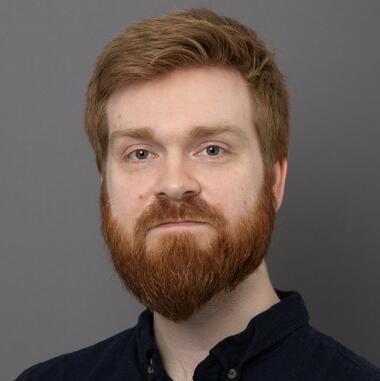
Halvor N. Risto
Prosess, Energy and Automation (USN)
Campus Kongsberg
Cybersecurity in Air traffic
My PhD-project
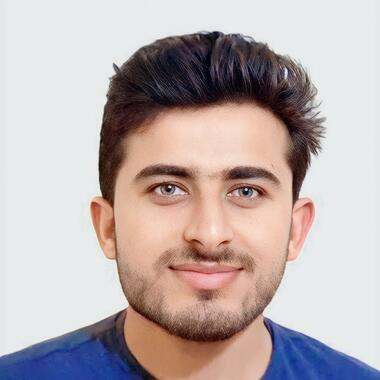
Touseef Sadiq
Information and Communication (UiA)
Campus Grimstad
Deep multimodal learning
My PhD-project
Project Title: Learning Multimodal Intermediate Video and Language representations in Deep Networks for Descriptive Object Identification and Tracking in Urban Environments.
Brief Description: Touseef started his PhD position in September 2021 at University of Agder, Grimstad Norway. Our primary contribution is in the field of big data analytics for multi-modal information, which aims to advance the development of technologies, applications, and services that enhance resilience. The purpose is to improve safety and security in smart districts with a particular emphasis on content analysis in the absence of metadata for the detection and reconstruction of abnormal activities with preventative, operational or intelligence objectives.
Urban areas are facing rapid growth and require efficient management of resources such as energy, water, and transportation to improve citizens' quality of life while also increasing society's resilience. In this PhD project, we investigate the fusion of video and language modalities through deep learning models to enhance descriptive object identification and tracking in urban environments. Our goal is to bridge the semantic gap between visual and language modalities, which have different statistical properties, and to focus on relevant semantics for correlating visual context and language content in joint embedding spaces. Our investigation into the fusion of video and language modalities through deep learning models has promising applications in various smart city domains. For example, the enhanced descriptive object identification and tracking can be used for object retrieval in videos using text descriptions, which can aid in road traffic monitoring, crowd monitoring and person activity recognition in urban environments. These findings have potential applications in various smart city domains, including intelligent transportation systems, emergency services, and other related areas, to optimize resource management and enhance citizens' quality of life.
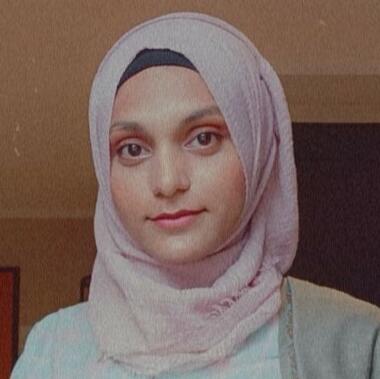
Shahzana Liaqat
Applied Micro-and Nanosystems (USN)
Campus Vestfold
5G Security
My PhD-project
Title of the project: Evaluating 5G Core Network in the Context of Cybersecurity for Critical Communication
Project Description: In Norway, various critical communication services, including those of the police, healthcare, fire, and rescue departments, rely on Nødnett, which is built on TETRA network technology. However, The Norwegian Directorate for Civil Protection (DSB) has plans to transition away from this system and adopt a 4G/5G-enabled Next Generation Critical Communication (NGCC) ( Nødnett in Norway ) As part of this transition. The day-to-day operations and maintenance of Nødnett will be decommissioned by the end of 2026. The Norwegian government has determined that the Next Generation Nødnett(NGN) will be implemented on commercial mobile networks utilizing 4G and 5G technology.
The RAKSHA project aims to conduct research on the integration of threat modelling techniques with a cyber range approach for simulating potential 5G-specific risks to the NGCC Network and evaluating the effectiveness of countermeasures.
Project Partners: The consortium consists of two groups – research and industry. The research group consists of SINTEF Digital (SINTEF), Simula Metropolitan (SimulaMet), University of South-Eastern Norway (USN), and University of Oslo (UiO). The industry group consists of Norwegian Communications Authority (Nkom), Nasjonal Sikkerhetsmyndighet (NSM), and Telenor ASA (Telenor).
This Ph.D. research project aims to focus on the security of Work Package 4(WP4) in collaboration with SIMULAMet and SINTEF. The primary objectives of WP4 include:
- Hardware-assisted authentication methods that were proposed in WP4 will be further developed.
- By conducting real-world demonstrations in WP3 and WP4, we hope to increase awareness of the importance and societal significance of cyber security in cellular networks, which may help to make it a more attractive career choice.
- The ethical hacking courses offered on our 5G cyber range platform in WP4 will produce highly qualified candidates for positions in this field.
- The project aims to improve the cyber resiliency of our digital society by creating new authentication and attack detection mechanisms to protect critical infrastructures.
- We plan to develop energy-efficient and privacy-focused methods for protecting mobile and IoT devices, autonomous vehicles, and drones against wireless attacks using the lightweight on-device privacy protection demonstration developed in WP4.
- Using the proposed 5G eSIM techniques WP4, we will develop new end-to-end authentication approaches for services accessed through mobile networks.
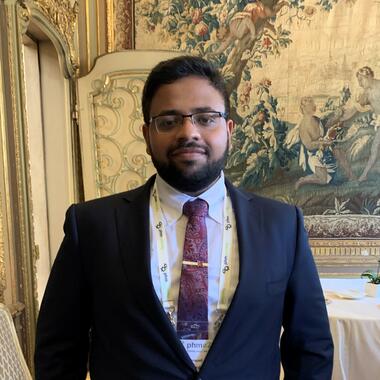
Manuel Sathyajith Mathew
Information and Communication (UiA)
Campus Grimstad
Wind farms
My PhD-project
Project title: Analytics for Wind Farm Asset Management
Project description: A significant portion of wind turbines, currently in operation, will reach the end of their designed life in the coming years. These turbines need regular maintenance, which requires extensive planning and expensive replacements. This makes the Prognostics and health management of wind farms essential for the efficient operation of these assets. Initially the health status of wind energy systems would be quantified at component and turbine levels using intelligent learning algorithms, which would be then extended for the estimation of remaining useful life of the wind turbines. Finally, we develop a reinforcement learning based control for maximizing both the power output as well as the remaining useful life of the wind turbines.
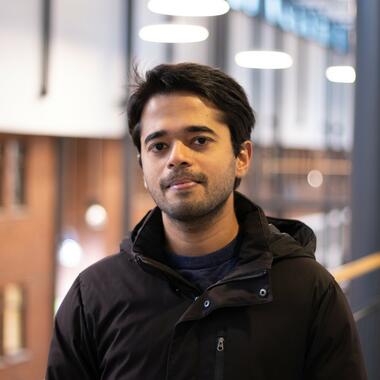
Kevin Roy
Information and Communication (UiA)
Campus Grimstad
A.I. for Offshore Mechatronics
My PhD-project
Project Title: Design of soft sensors based on context aware data-fusion and machine learning techniques.
Brief description: Soft sensor design has emerged as a vital engineering field that can make use of the recent advancements in the fields such as Oil and Gas industry, Automotive industry, water networks etc. However, for industrial plants in petrochemical and refining production, it is still important to improve methods for soft sensor designs, in order to reach better estimation accuracy, prediction and estimation of products quality. Under uncertain conditions, it is connected with the overcoming of difficulties such as accounting for the variable time of output measurement and a lack of information about the model's structure. The objective of my Ph.D. work is to develop real-time data- driven machine learning (ML) algorithms to improve the efficiency and performance of context aware Soft sensors. In particular, graph topology identification will be proposed as a tool aimed at understanding the spatio-temporal interactions among various parameters associated to the process variables to estimate. The work is funded and supported by Sentrene for forskningsdrevet innovasjon (SFI) under work package 6 (Data Analytics, IT Integration and Big Data).

Michal Darowski
Information and Communication (UiA)
Campus Grimstad
Process control and optimization
My PhD-project
Project title: Machine Learning for Ultra Precision Process Control and Optimization
Brief description: In this project, we are looking into improving ultra-precision polishing process efficiency by reducing time, material waste, and ultimately the cost of manufacturing. The goal is to apply machine learning that will improve the process determinism and understanding.
Background: Michael obtained a first-class BEng degree in Computer Systems Engineering from Bangor University (Wales) in 2018. He was awarded the Data Lab scholarship (Scotland's Innovation Centre for AI), and in 2020 he received an MSc degree with distinction in Artificial Intelligence from the University of Aberdeen (Scotland).
During the summer of 2017, he worked as a control systems intern for Zeeko Ltd at National Facility for Ultra-Precision surfaces (UK), where he was involved in developing an automated system for optics manufactury. Since 2020 he is involved with the Ultra-Precision Surfaces research group based at the University of Huddersfield (England), where he is responsible for the process automation, prototyping, and software implementation for the Swing Arm Profilometer project.
His current research focuses on the application of machine learning for ultra-precision process control and optimization. He is particularly interested in AI and ML applied to the engineering and manufacturing sectors as well as concepts such as Industry 4.0, cyber-physical systems, automation, and digitalisation.
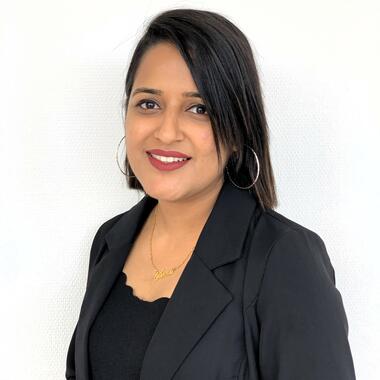
Swaechchha Dahal
Prosess, Energy and Automation (USN)
Campus Vestfold
Operational Security
My PhD-project
Project Title: Optimal Operational Security Within Smart-grid and Hydropower Systems
Brief Description: In light of climate change's challenges on energy supply, this Ph.D. research emphasizes optimizing hydro-power grid security. It delves into a comprehensive analysis of weather patterns' implications on power flow. The project also integrates real-time weather data into Security Constrained Optimal Power Flow (SCOPF) methodologies for hydropower systems with the aim to develop early warning systems and formulate adaptive re-dispatch strategies, ensuring the grid's robust response to diverse climate scenarios.
Background: Swaechchha Dahal received her M.Sc. degree in power system engineering from the Department of Electrical Engineering, Pulchowk Campus, Tribhuvan University, Nepal in 2021. She has three years of experience specializing in transmission line design and involvement in hydropower projects across Nepal. She's currently pursuing a dual Ph.D. at the University of South-Eastern Norway and Kathmandu University. Her research delves into optimal power flow, smart grids, machine learning applications in power systems, and power system security. She is keen on seeking opportunities to both apply and further enhance her expertise in the power systems industry.
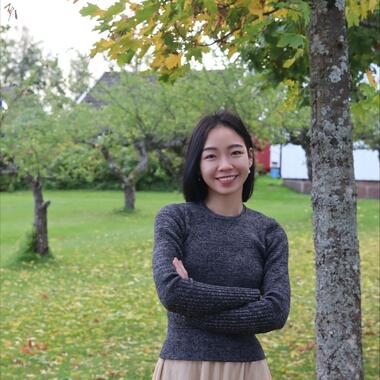
Le Hoang Vuong Nguyen
Technology (USN)
Campus Vestfold
Micro-& Nano system technology
My PhD-project
Project Title: Design and synthesis of metal covalent organic frameworks as single-atom catalyst towards water splitting
Brief Description: The excessive burning of fossil fuels and the resulting greenhouse gases have adverse impacts on the environment, biodiversity, human well-being, and the global economy. Shifting towards renewable energy sources is imperative to mitigate these effects. Among the promising eco-friendly energy solutions, hydrogen fuel stands out as it produces only water when burned.
Water splitting is an essential and environmentally friendly way to yield hydrogen (H2). This process involves utilizing energy to drive an electrochemical reaction that yields hydrogen and oxygen as byproducts. Currently, industrial electrocatalysis for water splitting process heavily relies on noble metals like single-crystalline Pt and its alloys, which come with challenges such as scarcity and high costs. The raised question is whether we can develop a sustainable electrocatalyst that improve the hydrogen evolution reaction (HER) while reducing input energy?
This research investigates the empirical synthesis strategy for a novel catalyst to enhance the production of hydrogen (H2) through the process of water splitting. Our primary focus is on enhancing catalyst activity by incorporating transition metal nodes into covalent organic frameworks (COFs), resulting in Metal-Covalent Organic Frameworks (MCOFs). These MCOFs have the potential to reduce overpotential in the water splitting process, exhibit long-term durability even after multiple cyclic voltammetry (CV) cycles, and are more abundant and cost-effective.
The aim of this project is to provide a comprehensive synthesis procedure for a novel electrocatalyst that meets the following criteria for HER:
- Lower overpotential compared to conventional and existing studied products.
- Improve long-term durability by maintaining the stability of the developed MCOFs framework, preventing dissolution and oxidation during redox processes.
- Enhance kinetic reaction rates by utilizing the porous surface area of MCOFs, promoting better reactant contact and faster kinetics in HER.
- Utilize low-cost materials with transition metals in the COFs framework to ensure favourable conductivity and reduce catalyst costs by utilizing abundant Earth resources.
About me: I am pursuing my PhD project at the University of South-Eastern Norway (USN), Vestfold Campus, starting in August 2023. I earned my master's degree in Micro- and Nano System Technology with a specialization in biomedical microelectromechanical systems (BioMEMS) at USN in the same year. My master's project focused on developing a cost-effective and user-friendly Lab-on-a-disc device that utilizes Loop-Mediated Isothermal Amplification (LAMP) to detect DNA/RNA of pathogens. During my master's program, I gained valuable experience by working for five months at Zimmer & Peacocks AS as an On-call Engineer, where I focused on sensor fabrication and electrochemistry testing. Additionally, in 2021, I completed my bachelor’s degree in Electrical & Electronics Engineering, with a thesis specializing in Power Electronics, focusing on a fast charge device for mobile applications.
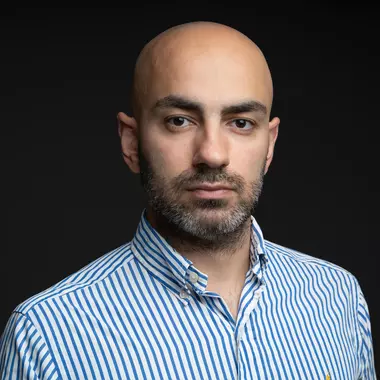
Mehdi Poornikoo
Nautical Operations (USN)
Campus Vestfold
Trust in Automation
My PhD-project
Project title: Systems approach to human-autonomy interaction (HAI), case of Trust in Automation.
Brief description: My Ph.D. is focused on modeling human-automation interaction for Maritime Autonomous Surface Ships (MASS). More specifically, I am engaged in modeling “trust in automation” to understand how an operator’s trust mediates reliance on automation, which may affect the overall system’s performance. I am applying the principles of systems engineering and system dynamics modeling to address such complexity as an inherent characteristic of today’s socio-technical systems. Moreover, I aim to explore the psychophysiological measurements to validate my proposed model via an eye-tracking experimental study.
Background: I am a doctoral candidate at the Department of Maritime Operations (IMA), University of South-Eastern Norway (USN). I have completed my master’s degree in System Dynamics from the University of Bergen (UiB) and a bachelor’s degree in Industrial and System engineering from Azad University (IAU).
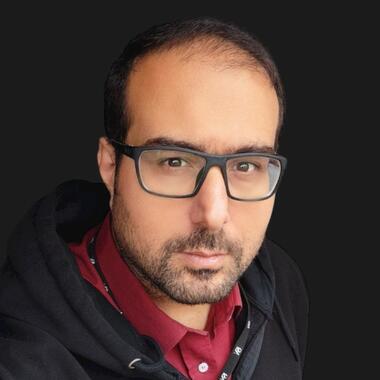
Zahir Barahmand
Prosess, Energy and Automation (USN)
Campus Porsgrunn
Bioenergy
My PhD-project
Project Title: Life cycle assessment of biomass gasification processes from a circular economy perspective.
Brief Description: Renewable energy derived from organic materials known as biomass is a unique and versatile form of renewable energy. With over 55% of the world's renewable energy supply coming from bio resources, it plays an important role in global energy supply. It is because of this unique ability that bioenergy occupies a strategic position in the energy mix. Furthermore, bioenergy fits well within the framework of a circular bioeconomy, where principles such as safeguarding and regenerating the health of our ecosystems, avoiding waste, prioritizing biomass streams for basic human needs, utilizing and recycling by-products of ecosystems, and minimizing overall energy consumption, are central to the development of a circular bioeconomy. As a potentially transformative technology within the bioenergy sector, gasification stands out. It is a thermochemical process in which carbonaceous materials are partially oxidized at high temperatures (700–1000 °C). This process generates a product gas composed of a mixture of energy-rich gases, mainly hydrogen (H2), carbon monoxide (CO), and methane (CH4).
In this project, the primary objective is to assess the environmental impacts associated with the operation and maintenance of gasification reactors at USN and SINTEF Energy. USN has a Fluidized Bed Reactor (FBR). The FBR can handle fuel with variable properties like different sizes and moisture content. The reaction rate and the carbon conversion efficiency are high however, the tar content is generally high in the fluidized bed reactors. In fluidized bed reactors, there are also problems with ash melting and the formation of agglomerate from the bed material. SINTEF Energy operates an Entrained Flow Reactor (EFR). Gasification with an EFR has some benefits, like material flexibility, high-temperature slagging operation, and high char conversion due to operation at higher temperatures. Nevertheless, the requirements of abundant oxidants, reducing the size, and the low cold gas efficiency can be the disadvantages of the EFR.
As part of this assessment, the OpenLCA software and Ecoinvent database will be used to conduct Life Cycle Assessments (LCA). As part of the evaluation of the environmental effects, various material flows will be evaluated for the production of synthesis gas. Moreover, the side streams of tar, biochar, and ash will be assessed to determine whether they can be utilized effectively within a circular process.
The project will also be guided by the following sub-objectives:
Circular Economy Level: The project aims to investigate important circular economy indicators associated with bioenergy and specifically, the gasification process. The intention is to create a connection between these indicators and the primary objective of the project, thereby enhancing our understanding of how the gasification process can contribute to a circular economy.
Process Level: The project plans to compare CPFD simulation results with Aspen Plus simulations validated against experiments conducted at gasifier reactors at USN and SINTEF Energy. The sensitivity of different process parameters such as temperature, pressures, steam-to-biomass ratio, and equivalence ratio will be studied in the evaluation of carbon conversion efficiency. This scenario-based analysis aims to create a robust LCA model that accurately represents the realities of the gasification process.
LCA Level: The project intends to conduct a comparative LCA for both fluidized bed and entrained flow processes. This comparative analysis will help to identify the most environmentally efficient process and inform future operational and maintenance practices.
Through the accomplishment of these objectives, the project aims to provide valuable insights into the environmental impacts and circular economy potential of the gasification process, thereby informing future research and practice in the field.
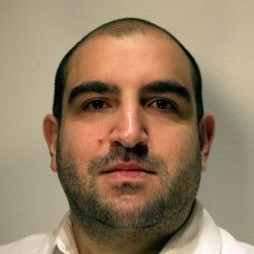
José A. Netto Andrade
Engineering Science (UiA)
Campus Grimstad
Autonomous Systems
My PhD-project
Project Title: Connected Heterogeneous Autonomous Systems
Brief Description: My PhD project lies in the field of autonomous navigation, encompassing sensing, perception, decision-making and communication. In particular, I investigate methods to enhance flexibility, robustness and scalability of such systems. My goal is to empower mobile agents such as drones and UGVS to perceive environments and cooperate with each other effectively. That involves gathering information from distributed, asynchronous, and heterogeneous sensor nodes and facilitating ad-hoc communication in limited settings. That is achieved by combining deep learning techniques, embedded computers, and a diverse range of sensors such as RGB cameras, thermal cameras, mm wave radars and lidars.
Background: José received a diploma degree in Electrical Engineering from the University of São Paulo (Brazil) with emphasis in Control and Automation in 2013 with a year research at Karlsruhe Institute of Technology (Germany). He also received a Master master's degree in Mechatronics Engineering from University of São Paulo in 2020 with implementation of Reinforcement Learning for ship navigation in port channels. He worked as trainee in a multi-segment company and as software engineer for test automation, maritime immersive simulators and machine learning applications. He is currently a PhD Research Fellow at UiA sponsored by SFI Offshore Mechatronics.
With his technical background, José developed skills in the development, integration and troubleshooting of complex systems. As a member in the program, he could contribute to areas involving distributed/embedded software development, machine learning, computer vision, simulation, and control.

Fei Song
Faculty of Engineering (NTNU)
Gløshaugen
System Thinking
My PhD-project
Project title: Modelling human impacts on marine ecosystem services
Brief description: My research is based in area of industrial ecology, which is closely related to both industry and system thinking. At the moment, my work is concentrated on identifying the consequences of industrial systems, with a focus on the plastic leakage into the ocean. Due to its intricate connections with supply networks, consumer behavior, and industrial processes, this complex issue goes beyond environmental aspect. My research captures the spirit of investigating complex systems within the framework of industrial ecology by diving into the complex web of factors causing plastic pollution and its effect on marine ecosystems.
Background: I have always been interested with nature and environment, and the interaction of industry, society and environment has been attracting me. My bachelor focused on graphene catalyst for wastewater treatment. After finishing my master in industrial ecology, I continued working as PhD with special focus of Life cycle assessment (LCA), which further explore the environment relationship with industries. The ultimate goal of industrial ecology, in my opinion, should not be to place environment blame but rather to assist industries in creating closed loops and sustainable growth with system thinking.
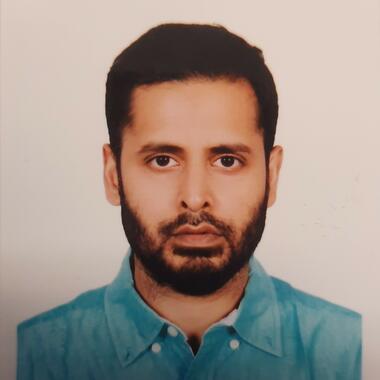
Tanver Ahammad Hazar
Manufacturing and Civil Engineering (NTNU)
Campus Gjøvik
Digital Twin in Circular Manufacturing
My PhD-project
Project Title: Integrating Digital Technology for the End-of-Life Decision making to ensure sustainability.
Brief Description: Circular Manufacturing is one of the key activities to ensure the long-term sustainability. One of the key decisions which needs to be made in circular manufacturing is the optimal use of a product after its end of functional life. To ensure all aspects of a sustainable solution, it is important to take advantage of the advanced technology. In this study, the application of Digital Twin (Digital Model) will be studied for end-of-life management of aluminium products. The objective is to develop a multi-criteria decision-making tool, which will help to assess the “business decision” at the end of the life of a product to enable the circularity. This tool would assess or try to predict the potentiality of all the end-of-life options in terms of predefined indicators in proactive basis, and this knowledge could be further utilized during the design and manufacturing phase of the product.
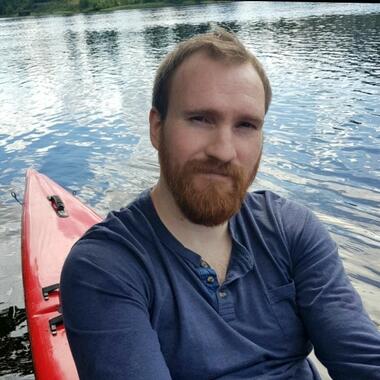
Morten Grundetjern
Department of ICT (UiA)
Campus Grimstad
Artificial Intelligence
My PhD-project
Project Title: Advancing Neural Networks for User Insight: Contextual Content Generation and User Behavior Understanding via Synthetic Persona-Based Evaluations
Brief Description: My research is part of the AIM project, focusing on assisting Dyreparken in better understanding their users through a data-driven approach. The project aims to develop and test innovative AI methods for analyzing and interpreting user behavior. Key aspects of my work include creating synthetic personas to emulate user demographics and behaviors, which are instrumental in generating realistic feedback and data for downstream applications like recommendation systems and explanation models.
Background: I completed a Master's in Information and Communication Technology (ICT) with a focus on AI, specializing in Generative Adversarial Networks (GANs) for fashion marketing. My Bachelor's degree in software engineering led to the development of augmented reality glasses for visual impairments. Before entering academia, I worked as an electrician, providing practical insights into the application of technology.
Additionally, I have two years of experience as an AI consultant at Sikri, where I focused on Natural Language Processing (NLP). This experience has furthered my understanding and expertise in AI, particularly in the context of user interaction and language-based data analysis.
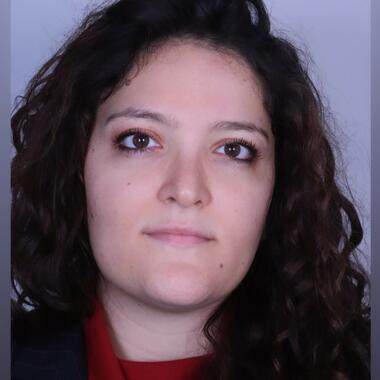
Maria Elena Perruzza
Department of ICT (UiA)
Campus Grimstad
Particle Physics, Machine Learning
My PhD-project
Project title: Anomaly Detection in High Energy Physics at CERN
Brief description: With the rapid progress of technology, experiments in High Energy Physics (HEP) generate vast quantities of data, posing challenges to manual analysis and interpretation. In recent years, significant advancements have been made in Machine Learning (ML), which has successfully addressed various research problems in Particle Physics, including anomaly detection, particle identification, and trajectory reconstruction. Despite the promising results, these ML algorithms encounter computational challenges due to the high dimensionality of HEP data, characterized by numerous features and variables. As a result, a thorough exploration of model architectures, hyperparameters, and optimization strategies is required. Furthermore, while sophisticated ML models exhibit excellent predictive performance, they often lack interpretability, making the extraction of meaningful physical insights difficult. Striking a balance between utilizing complex models to capture intricate physics and ensuring interpretability is essential.
In this work, our aim is to enhance the performance of these applications by utilizing the CMS Open Data while also prioritizing the physical interpretation of the learned representations. The focal point of the project will be to develop a Particle Identification algorithm using End-to-End technologies and Graph Convolutional Neural Networks.
Background: Physics of Complex Systems
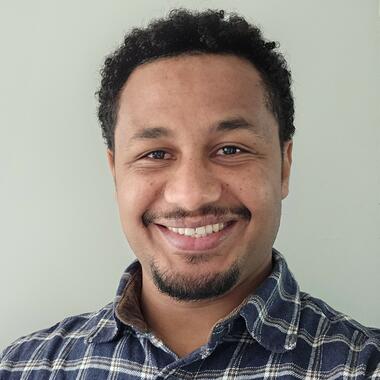
Mulugeta Weldezgina Asres
Department of ICT (UiA)
Campus Grimstad
Machine Learning
My PhD-project
Project Title: Anomaly Detection, Prognostics, and Diagnostics: Machine Learning for Large Complex Systems at the Hadron Calorimeter of the CMS Experiment.
Brief Description: Machine Learning (ML) tools have become increasingly popular due to the abundance of sensor data that is used for monitoring, predictive and diagnostic applications in different industrial domains. The Large Hadron Collider (LHC) at CERN, which is the most powerful particle collider ever built worldwide, operates at the energy and intensity frontiers of high-energy physics, and aims to reveal new physics and answer the grandest questions of our universe. The LHC has recently undergone crucial upgrades to achieve the high luminosity LHC program, which has increased the complexity of its components, requiring advanced ML tools to automate its operations.
Ensuring the quality of physics data requires timely monitoring and the resolution of detector anomalies. The existing monitoring systems need to incorporate a wide range of monitoring variables and adapt to the evolving conditions of the LHC detectors.
Our Ph.D. research focuses on developing unsupervised anomaly detection (AD), anomaly prediction (AP), and root-cause analysis (RCA) for high-dimensional data sets of the frontend electronics and online data quality monitoring systems of the Compact Muon Solenoid (CMS) detector of the LHC. Our research uses deep learning advancements to monitor complex systems with thousands of sensors through a divide-and-conquer approach using subsystem-granularity modeling.
Our developed monitoring tools have detected and identified previously unknown and hard-to-monitor anomalies, extending the CMS detector's real-time monitoring, diagnostics, and prognostics automation.
Background: Mulugeta W. Asres received his B.Sc. and M.Sc. in computer engineering at EiT-M, with honor of gold-medal awards in 2012 and 2016, respectively. He conducted his master thesis and post-graduate research in machine learning for non-intrusive load monitoring at Midori Srl, an innovative energy efficiency start-up incubated in I3P, Italy. He carried out R&D in predictive maintenance at the Polytechnic of Turin, for several AI-powered industrial data science and monitoring applications including residential and commercial energy analytics, telecommunication networks, automotive manufacturing, and software computational analytics. Recently, he submitted his Ph.D. thesis at UiA in deep learning for a large complex system monitoring at the CMS experiment at CERN.
His general research interest revolves around deep learning, data-driven modeling, predictive maintenance, anomaly detection, IoT, and Industry 4.0.
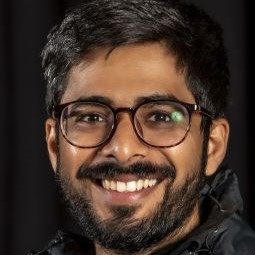
Ajay Vishwanath
Information and Communication (UiA)
Campus Grimstad
Artificial Intelligence
My PhD-project
Project Title: Dilemmas and Choices in games: From machine learning to artificial virtues in intelligent systems
Brief Description: A need to ensue, safe and ethical atificial intelligence arises due to the rapid rise of these technologies in this centrury. Apart from the research on ethical usage of AI, simultaneous effort is required to study and design inherent vitues in AL. This work investigates virtues within atificial agents by training these agents to solve a role-playing game riddled with moral dilemmas. Using highly effective frameworks such as deep reinforcement learming to train agents, we analyse the decisions using state-of-the-at explainable AI (XAI) techniques to interpret and explain them through a virtue ethical lens, to truly understand whether the agent has developed virtues. This way, a platfom to test a variety of artificial agents is developed to compare AI algorithms in tems of their inherent virtues. On top of this system we explore the prediction of virtues of other agents using techniques such as inverse reinforcement learning and Bayesian inference, and finally, to train an agent to behave virtuously to achieve favourable outcomes, given the uncertainty surrounding of virtues of another agent. Overall, this work aims to develop antificial virtuous agents.
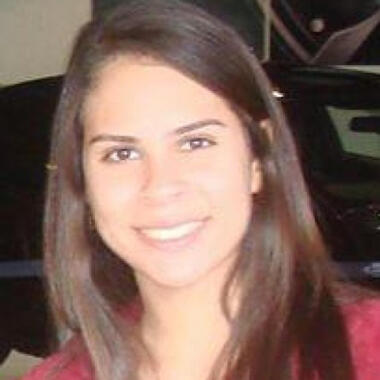
Ana Lyvia Tabosa Da Silva
Mechanical Engineering (NTNU)
Gjøvik
- Product Developement
- Life Cycle Assessment (LCA)
- Circular Economy
My PhD-project
Project Title: Circular Business Model and Life Cycle Performance for Recycled Aluminium-containing Structural Products
Brief Description: Aluminium (Al) is a strategic raw material for modern technologies that contribute to the transition to a climate-neutral and circular economy. Various sectors of the economy had groundbreaking advances thanks to the use of Al alloys, furthermore, helping them achieve their climate pledges. Due to this, there is an expected increase in Al demand in the years to come. Opposingly, primary Al production causes significant environmental impact, so Al circularity (recycling, reusing, recovery, and reduction) plays a leading role in maintaining Al as a climate and resource front runner. My PhD project focuses on assisting Al supply chain’s sustainability with the aid of computer simulation. Life Cycle Simulation (LCS) will be used for quantifying the environmental and economic loads of different circularity strategies in a product system throughout its life cycle. Ideally, a Norwegian Al producer will be used as a case study.
Background: Ana is a PhD candidate in the Alugreen project, at the Department of Mechanical and Industrial Engineering at the Norwegian University of Science and Technology (NTNU). She graduated with a double Master’s degree, one granted by NTNU as a MSc in Circular Economy and the other granted by TU Delft and Leiden University (The Netherlands) as a MSc in Industrial Ecology. Ana has worked in academic and non-academic settings exploring environmental sustainability. Before starting her PhD, she worked with eco-design of emerging technologies, using the Life Cycle Assessment methodology (LCA). Her academic interests are in fostering the transition toward the Circular Economy focusing on assessment tools for the quantification of environmental, economic, and social impacts of production systems.

Muhammad Talha Bilal
Department of Engineering (UiA)
Campus Grimstad
Mechatronics
My PhD-project
Project Title: Automated Disassembly of end-of-life EV Battery Packs using Cognitive Robotics and Artificial Intelligence
Brief Description: The project focuses on automating electric vehicle (EV) battery recycling through cognitive robotics and artificial intelligence, highlighting a sustainable future for handling increasing battery volumes. It delves into automating EV battery pack disassembly to module level, leveraging vision and robotic manipulation. The aim is to streamline the planning tasks including strategy generation, path planning, and quality checks, thereby enhancing the recycling process's efficiency and safety. This research is pivotal for the Southern Norway region's ambition to become a battery hub, facing challenges like varying battery designs and non-detachable joints. The project's success will not only bolster the circular economy but also mitigate the environmental impact of battery disposal.
Background: Talha is a PhD Mechatronics candidate at the University of Agder, with a strong foundation in robotic vision systems, industrial robotics, and machine learning. His Masters in Advanced Robotics from École Centrale Nantes (France) and Jaume I University (Spain) coupled with a BSc in Electrical Engineering from the University of Engineering and Technology Taxila (Pakistan), have equipped him with both theoretical knowledge and practical skills. Talha has applied his expertise in Python, C++, MATLAB, and machine learning in the design of solar integrated appliances, reflecting his commitment to sustainable engineering practices. While his proficiency in Norwegian is still developing, his fluency in English and native grasp of Urdu and Punjabi enable him to thrive in diverse, multicultural environments. His passion for innovation and eagerness to learn position him as a prime candidate ready to contribute to the future of sustainable energy.
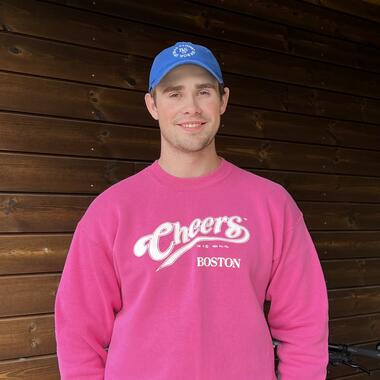
Sander Riisøen Jyhne
Information and Communication (UiA)
Campus Grimstad
Artificial Intelligence
My PhD-project
Project Title: Towards automated 3D geospatial objects from optical imagery using deep learning.
Brief Description:
The main idea of the project is to use "raw" aerial images to generate precise 3-dimensional building models and classify the different parts of it according to the FKB-Building specification.
Key words: 3D models, Aerial Images, Building Models
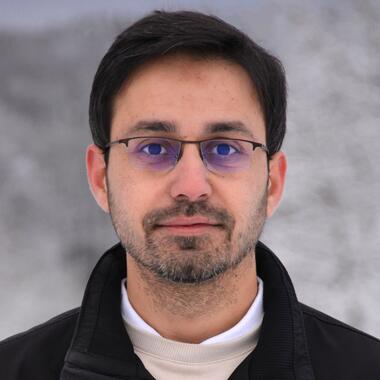
Sahil Waqar
Information and Communication (UiA)
Campus Grimstad
Electrical Engineering
My PhD-project
Project Title: Breaking Data Barriers for Radio frequency-Based Classification: Unveiling a Simulation-Centric Data Synthesis Framework for Human Activity Recognition via Radar Sensing
Brief Description: My PhD project focuses on advancing human activity recognition (HAR) systems using millimeter wave (mm-wave) radar technology through a simulation-centric approach. Like all classifiers, radio frequency-based classifiers rely heavily on empirical data, which can be challenging to obtain. For this project, a simulation-based framework is designed to generate diverse training datasets efficiently, offering a resource-efficient alternative to traditional empirical methods. The developed framework translates motion capture data into radar data, making it adaptable to various real-world applications beyond HAR, such as gesture recognition, sports, autonomous vehicles, social robotics, smart homes and more. Additionally, the framework's efficiency in adapting to changes in radar configurations stands as a distinctive strength, ensuring its utility across evolving operational requirements and emerging applications.
Background: Sahil Waqar holds a bachelor's degree in electrical engineering with Distinction from the University of Engineering & Technology (UET), Taxila, Pakistan, obtained in 2010. He furthered his academic pursuit with a master's degree in electrical engineering, earning a gold medal award from the National University of Science & Technology (NUST), Pakistan, in 2013. His master's research focused on probabilistic data association filters. With a robust foundation in academia, Sahil embarked on a professional journey spanning from 2012 to 2020, during which he specialized in the design and development of digital communication systems, signal processors, radar systems, and embedded systems. Since October 2020, he has been dedicated to the CareWell project as a PhD research fellow at the University of Agder, Grimstad, Norway. Sahil's current research interests encompass a broad spectrum, including machine/deep learning, sensors, MIMO radars, communications, signal processing, and embedded systems.
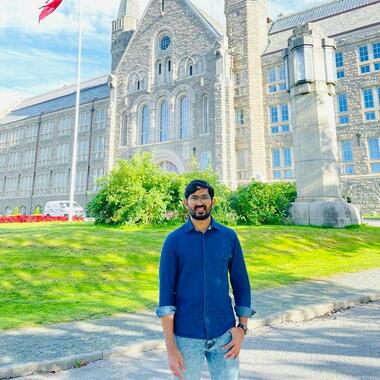
Hareesh Chitikena
Department of Engineering (UiA)
Campus Grimstad
Robotics
My PhD-project
Project Title: Modular Multi-terrain Snake Robot
Brief Description: The Modular Multi-terrain Snake Robot project aims to design and develop a versatile robotic platform capable of traversing various types of terrain with ease and agility. By utilizing a modular design approach, the robot can adapt to different environments and tasks, making it suitable for a wide range of applications such as SAR, industrial inspection and monitoring, and exploration. The project involves the integration of advanced control algorithms, innovative locomotion mechanisms inspired by snake locomotion. Through this project, we aim to push the boundaries of robotics research and contribute to the development of highly capable and adaptable robotic systems.

Angelos Bouchouri
Technology (USN)
Campus Vestfold
Field
My PhD-project
Project Title: High Performance Metalenses and 3D grayscale Lenses for Infrared Optical Systems
Brief Description: The aim of the project is to replace the expensive and bulky refractive Germanium lenses with inexpensive wafer thick Silicon flat lenses, using Metalenses and grayscale Fresnel Lenses. A big part of the project is to minimize optical aberrations. This requires accurate manufacturing but also simulations that will predict how the system will behave.
Background: Master in Physis - Optics/Photonics
Key words:

Student
University
Campus
Field
My PhD-project
Project Title:
Brief Description:
Background:

